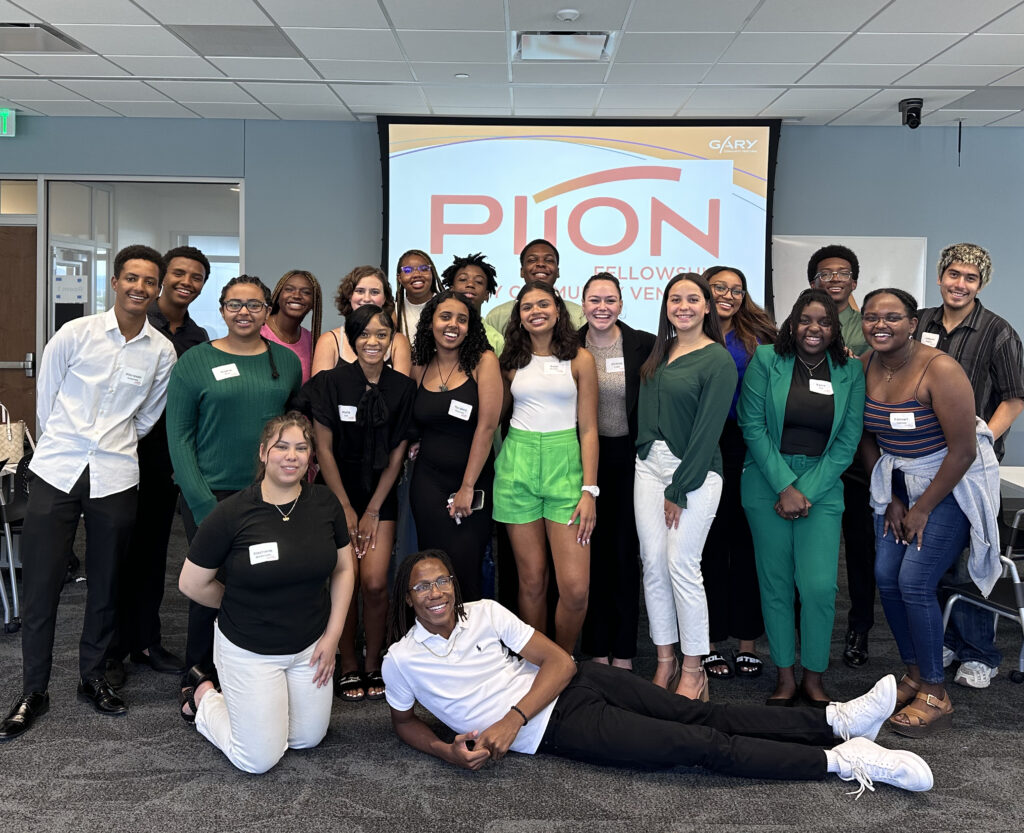
December 12, 2023
Sustaining and Growing Denver’s Diverse Talent: 7 Insights from the Piton Fellowship
PERSPECTIVES | With Liloni S.Ramos
Former Manager, The Piton Fellowship
If we’re going to expand the voice of leadership in Denver, we must partner with Denver’s next generation of civic leaders, including but not limited to leaders of color who, despite having all the promise and potential, have oftentimes been historically denied access to the careers and lives they want to build here in Colorado.
I’ve long believed that leadership sits at the intersection of identity and purpose. When I stepped in to lead the Piton Fellowship at Gary Community Ventures over a year ago, I had the chance to build on this belief not only for myself, but for rising leaders across Denver. As a 4th generation Coloradan, Denver Public Schools graduate, and education advocate, I saw so much opportunity to be part of a program dedicated to changing the face of leadership in Colorado, with a focus on a new generation of leadership, one driven by purpose and identity.
What does expanding the voice of leadership mean? At The Piton Fellowship, it’s a commitment to partnering with Denver’s next generation of highly talented civic leaders, including leaders of color and those who have courageously navigated systemic barriers to opportunity throughout their professional careers. Highly skilled leaders of color and those who reflect the broad array of identities and backgrounds from the Denver community note that this lack of access to networks and professional support limits their opportunity to fully explore their professional aspirations. At the same time, metro Denver employers are looking for highly skilled, diverse talent, and are experiencing challenges connecting to such professionals.
The Piton Fellowship aims to be part of the solution to bridge this gap between diverse talent and values-aligned employers, while nurturing the development of Denver’s next generation of executive directors, philanthropists, investors and innovators who will lead for Colorado kids and families. This approach is deeply inspired by our founders Sam and Nancy Gary, who held a poignant belief.
One of the most important ways to ensure that our mission is realized is by building strong human capital and leadership both internally and externally.
– Sam & Nancy Gary.
This year, we welcomed our 5th cohort of Piton Fellows, an incredible group of leaders across nonprofit, for-profit and government sectors. It was our most diverse cohort to date, an outcome shaped by past Piton fellows. Their insights, opinions, and perspectives made possible the diversity we at Gary, and so many other values-aligned companies, strive to have in our teams. With an acknowledgment that we’re still actively leaning into our own DEI values, we also wanted to share and amplify insights from the early career fellows that have supported our continued commitment to finding, connecting, and learning from and with diverse civic leaders.
- Social capital is an important part of career development, and the workplace can play a role in leveling the playing field for their employees. So often it’s not about what you know, but who you know, especially when thinking about leadership or leveling up in your career. When the privilege and resource of social capital isn’t part of someone’s upbringing, it can limit the synapses that connect great talent to great opportunity. This reality is often common for rising leaders of color. Compounding this, many early career professionals have been building foundational years of their career in a virtual setting. Virtual work spaces may be magnifying an issue already felt primarily by your employees of color. How are creating opportunities for the development of social capital in the workplace?
- The story of self as part of leadership development: A story of self communicates who we are – our values, our experience, why we do what we do. High-impact leaders share personal stories and experiences to inspire teams and partners to embrace their vision and ideas. Think about the magic that could happen when diverse, lived-experience is embraced and encouraged as part of your teams’ leadership development.
- Sponsoring Early-Career Talent: Want more diverse leadership? Sponsor rising talent. Sponsorship is more than mentorship, it’s being an advocate for rising talent alongside them and behalf of them in rooms and at tables they don’t yet have access to. Mentors share their knowledge, perspective, and experience, whereas sponsors leverage their network, power and resources on behalf of rising talent.
- Ongoing Learning: Rising leaders, both Gen-Z and millennials, place more value than past generations on continuous learning. In fact, it’s a key driver of fulfillment and satisfaction in their job. How is your company providing different learning opportunities, both within the scope of employees’ work and more broadly in the communities where they work?
- Dreaming Big: When was the last time someone invited you to dream big about your future? Along with network and knowledge, a fundamental piece of The Piton Fellowship is making space for goal visioning and goal setting. The chance to do this as a group of professionals, to have your big dreams validated, supported, and resourced, has produced big wins and strong relationships. With this model, we’ve seen fellows get promotions, raises, launch their own small business or start new careers. Supporting rising leaders means leading and following – make sure there’s space to dream of where they want to go.
- Show your commitment to BIPOC employees in actions throughout your decisions: Our commitment to equity and inclusion — and uplifting the voices and talents of leaders of color and those navigating systemic barriers to opportunity — is woven into every part of the Piton Fellowship. It’s not just about finding diverse leaders; it’s about creating a space where equity can thrive among vendors, facilitators, panelists, and staff. Our goal is for every person—regardless of background—to feel that this is a place where they belong, where authenticity is welcomed, and where equity is not just a value, but a guiding principle.
- Accepting feedback and acting on feedback: One of our guiding design principles throughout The Piton Fellowship has been to solicit and rapidly implement feedback from fellows. Our commitment to centering racial equity means acknowledging that we operate within systems that are designed by and for predominantly white people. Ensuring that our fellows have places to share feedback, and that that feedback is then responded to in the way we shape programming, communicates trust and commitment to their experience.

MANAGER, THE PITON FELLOWSHIP
Liloni S. Ramos
Liloni S. Ramos is a 4th generation Coloradoan and 3rd generation Denverite who grew up in Denver’s Harvey Park neighborhood. Being raised by her mother and grandmother, Liloni understood the power of education, service, and human connection at a young age.
